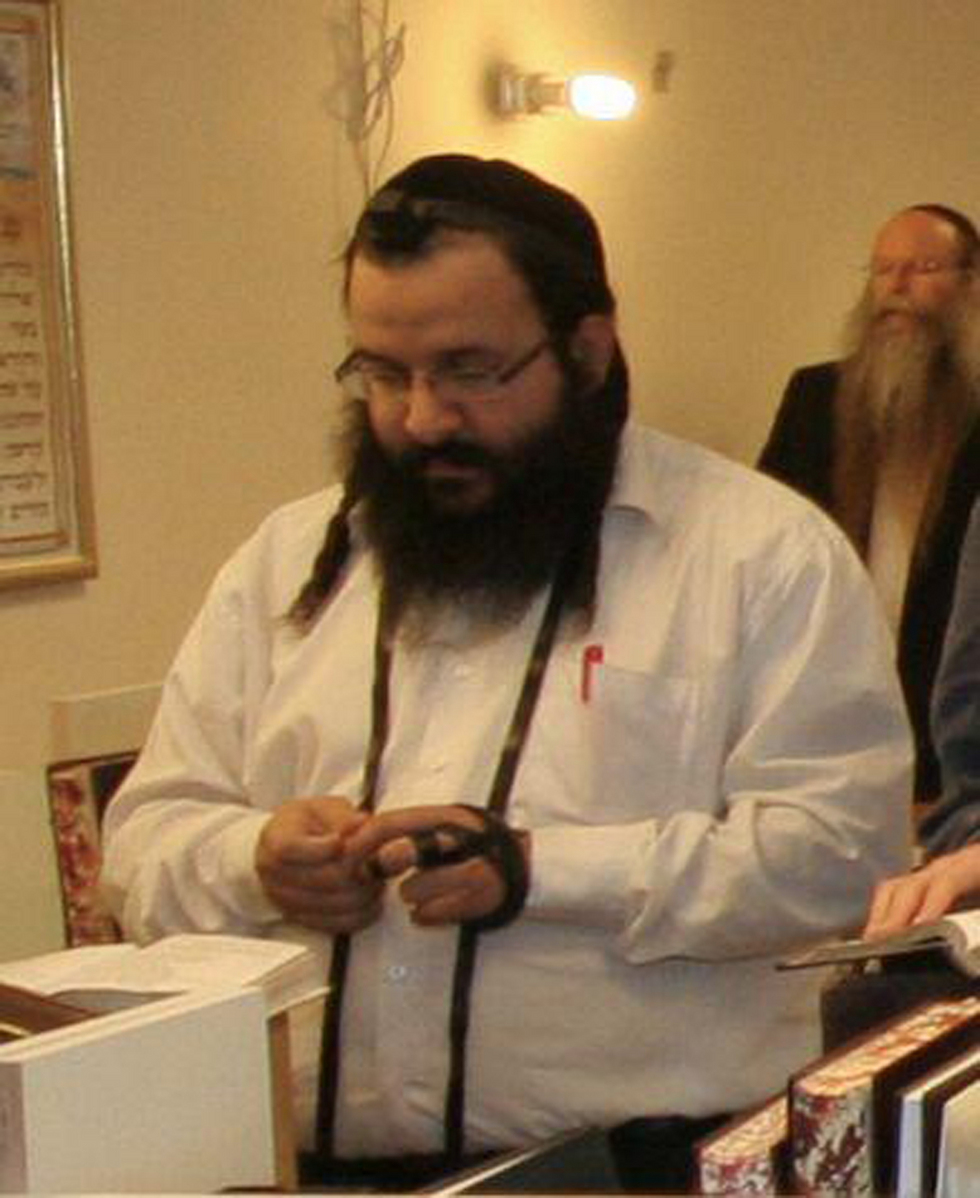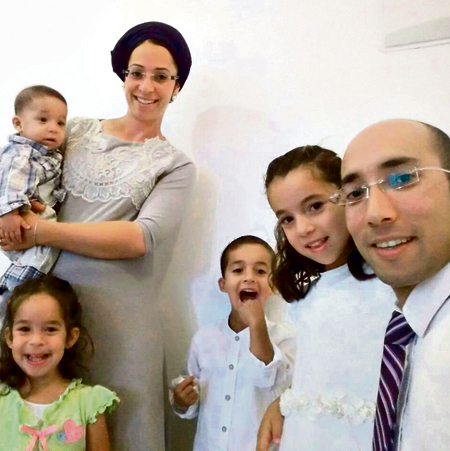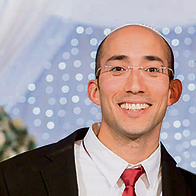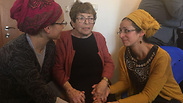
Two terror attacks, two widows, a shared pain
After losing their husbands Raziel and Itamar to terror one after the other, Yael Shevah and Miriam Ben Gal talk about the pain that brought them together. ‘During Raziel’s shiva, I really wanted to hug Yael but didn’t feel close enough,’ Miriam says. ‘Now you’re close,’ Yael replies, ‘and I feel I don’t want us to be apart.’
Miriam Ben Gal, 27, who lost her husband Itamar last week in a terror attack in Ariel, and Yael Shevah, 32, who lost her husband Raziel about a month ago in a terror attack in the Havat Gilad outpost, feel like brides too. The brides of mourning, remembering their wedding day together.
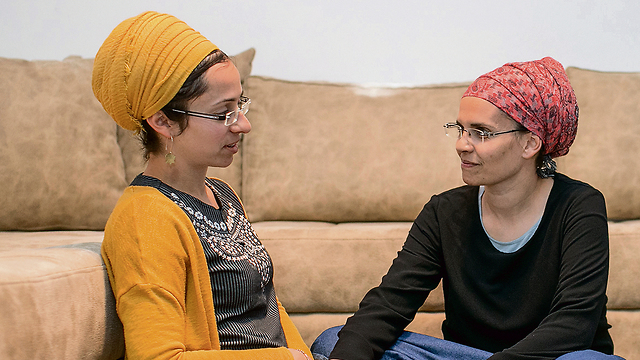
“When was the last time my parents held me from each side and led me, like in a funeral? Only in the chuppah (canopy under which Jews marry—ed),” Miriam asks and replies.
“That’s exactly what my father told me during the funeral,” Yael nods. “The entire way to the cemetery, my father kept saying, ‘Remember the last time you took me this way?’ It’s traumatic. You walk and your husband is in front of you, wrapped in a prayer shawl, the same prayer shawl from the wedding, and the entire audience marches behind you, just like in a wedding.”
"A funeral really is a life-altering event, just as much as a wedding,” Miriam says.
“A funeral is like a rebirth,” says Yael. “After the wedding, you embark on a new life. The same happens after death. Life changes and we have to be reborn, to upgrade ourselves.”
To get used to a new, delusional reality,” Miriam completes the sentence, and they smile at each other.
Last Tuesday, they met for a painful embrace over Itamar’s new grave. The next evening, they meet again. This time, they sit down for an in-depth conversation at the Ben Gal family home, in the community of Har Brakha. It’s the first day of the shiva (the week-long period of mourning) over Itamar and the final day of the 30 days of mourning over Raziel.
Before the loss that brought them together, they had only a nodding acquaintance. Barel, Raziel’s brother, a Har Brakha resident, was Itamar’s good friend. Emunah, Miriam’s sister, is a good friend of Yael.
“I didn’t know Yael very well,” says Miriam, “but as soon as I heard about Raziel’s terror attack, I got emotionally involved. I kept thinking about all the tiny consequences of not having a partner in life. I was extremely touched by the story. I came with Itamar to offer our condolences to the Shevah family at Havat Gilad. He came to console his friend, Barel. I really wanted to hug Yael, but I didn’t feel close enough.”
“Now you’re close,” Yael says. “I walk around all day feeling I don’t want us to be apart.”
They have chosen to turn their tragedy into a mission, to search for a meaning for the pain, and to grow from it rather than sink into it. Yael has been leading, together with the Samaria council head, the campaign to legalize Havat Gilad.
“There’s a reason why people say, ‘Bebinyan haaretz nenuham’ (building the land will comfort us). The legalization doesn’t ease my private grief, but it gives it some meaning and it provides comfort on the national level,” she says.
Miriam dreams of the day Har Brakha will become a city. “I want to see construction. Here, down the street, 800 housing units were planned legally. They have been frozen since (former US President Barack) Obama and are waiting for approval. I would like to see them being built soon. It’s in the Israeli prime minister’s hands. And I say to him, there’s no greater comfort than building, than adding life.
“That’s the most genuine response to terror. I want every terrorist to know that if he takes lives, we will add more life and more neighborhoods and more yeshivot, and the Land of Israel will only expand. I believe that if this becomes the answer to terror, Itamar’s blood will be the last blood to be shed.
“For me, on the personal level as well, it’s the greatest comfort, because I know how important it was to Itamar and how much he worked to bring more students to the Har Brakha Yeshiva and to bring more families to the community.”
Samaria Regional Council head Yossi Dagan, who has been supporting the two women from the moment of the terror attack through the hospital to the funeral, says the construction of 800 housing units is not a distant dream. “There is already a project outline,” he reveals.
So every time someone is murdered in Samaria, they’ll build more and approve more settlements which were established illegally?
“We always have to build, especially after such a horrible terror attack. This is how the State of Israel was built 70 years ago. Apart from strengthening the family and the people, this is a clear message to the terrorists. This move must be immediate, to make it clear to them in Jenin that this is happening because of this murder. You came to destroy one home? You’ll get 800 homes.”
‘A lifelong mission’
The sisters in fate and mission refuse to be seen as poor and miserable. When our photographer, Ohad, asks them to look serious, Yael replies: “You don’t look beautiful when you cry.”
As the camera rolls, Miriam says to Yael: “See, it’s just like the wedding photo shoot.”
“Miriam, you picked a nice shirt,” Yael says supportively.
“In this whole chaos and mess, it was important to me to pick a nice garment, in his honor. Itamar was very strict about clothing, he liked it to be nice and tidy.”
Yael looks straight into the camera. “How do we look? Beautiful?”
“Is this something you’d like to do for a living?” one of the neighbors asks with a smile?
“Do what for a living? Become a widow? We’re done with that already,” Yael laughs.
“What do you mean ‘we’re done’? It’s a lifelong mission,” Miriam says in a serious tone.
Yael apologizes for the cynicism. “It’s hard for people to understand how we can accept this loss without collapsing.”
“The discourse around bereavement is a weakening discourse,” says Miriam. “People emphasize the loss. They quote mourners’ sentences, like ‘nothing will heal the pain.’ It’s not something I connect to. It makes the death trivial, insignificant. I think that such a death as a martyr is meaningful. We have to ask ourselves how to keep living, and how to grow from here to become better people.”
“Throughout our history,” says Yael, “people have wanted to die this way. It’s not something I hope for, and I don’t wish it on anyone. Rabbi Joseph Karo—and I understand Itamar’s middle name is Yosef, after him—wanted to become a martyr. One of his insights was that the best thing for a Jew is to end his life as a martyr. It’s a tragic death, and it’s scary, and why now—at such a young age? But there is something special-Jewish-designated in dying that way. It’s something supreme, more than dying of cancer or in an accident, Heaven forbid.”
They hold hands and listen to each other. Miriam has some reservations: “It’s not that we think it’s ideal to die as a martyr. We are no longer in exile, like Rabbi Joseph Karo’s generation. We are in the Land of Israel, and we want to live. Our goal isn’t to die as martyrs.”
“There are many things that connect Itamar and Raziel,” Yael says. “Raziel was on his way back from a brit milah (circumcision ceremony). Itamar was on his way to a brit. It isn’t random. They were connected to life and lively and strong. Amazing people. People who were at the forefront of doing things.”
“Itamar was a man who lived the Tora,” says Miriam, “not because he studied Torah all day, but because he lived life to the fullest, like the Torah says you should. He thought everything had to be complete—the happiest, the best, the most loving, the most professional, the most enjoyable. He loved taking trips. He loved eating, he loved sleeping, he loved his wife, he loved his kids, he loved work and wanted to do everything the best possible way. This is what a real life of Torah looks like. Jumping with the children in the pool is Torah too, and so is going on vacation in Caesarea for three days, like we did. And what we liked best was to put on music and dance around with the kids, just like that on a regular day. To simply be happy.”
Miriam and Itamar raised four children together: Six-year-old Avital, four-year-old Daniel, 2.5-year-old Roni and 10-month-old Avraham.
“I told them that Father passed away,” she says,” that it’s sad and it’s painful, and that we’ll keep going together. They’ll give me strength and I’ll give them, and we’ll be happy. They’re small, they don’t understand enough. They’ll slowly understand. They’ll have no choice.”
“The children reset you, bring you back to life,” Yael says. “It isn’t east at night, but we both have a nursing baby, Miriam, and that’s the air. That’s the life. The baby needs me. It’s to hang onto something living.”
“I know we’ll keep living,” Miriam says. “It’s something I used to talk about with Itamar quite a few times. After your terror attack, Yael, he said to me: ‘Listen, it could happen to me too. I have to talk to my mother and tell her she has to be strong and not to fall apart.’ He didn’t get to talk to his mother about it. I don’t think it’s anything prophetic. It’s just something that crossed his mind, because we talked about the terror attack. It was clear to both of us that you don’t fall apart in such a situation.
“It was an unbearable feeling to think that something could happen to our huge love. Itamar was the perfect husband. I didn’t need him to die to be able to say that; I used to say it all the time. He knew how to show appreciation and support, both in words and in action. Every time he came shopping with me, the saleswomen at the store couldn’t figure out what was wrong with this husband who encourages his wife to spend money like that. If I had a hard time choosing between two dresses, he would say: ‘Take them both.’
“There was harmony between us, in our day-to-day life too. Before Shabbat, I would cook and he would clean. I always used to say to my mother that I have the best cleaner, because like everything else he did, he did it wholeheartedly.
“On Shabbat and holidays we would study together—Rabbi Kook, the Bible, Maimonides, Talmud. We were equal in our studying. Sometimes he explained to me, and sometimes I explained to him. Sometimes, we would deliberate together.”
‘What is there to be afraid of?’
“There will be pain,” Miriam knows, “there will be breakdowns. There will be great difficulty, but it’s clear we won’t move on by being poor and miserable, but by being strong. If it happened to us, it’s for a reason. Our souls were probably asked about it and agreed, and now I have to get my body to connect to that agreement. How? And what? And from where do you start anew? I don’t know. I do know it’s my job, and I have to figure out how to do it the best way possible.
“On the night after the murder, I was destroyed. I had trouble falling asleep. I tried to think about something that would calm me down so I could enter a state of sleep. I put all the thoughts of what and how aside, and I told myself I’m in God’s hands, that it’s his will and that he’s the one who will pick me up now during my worst moments.”
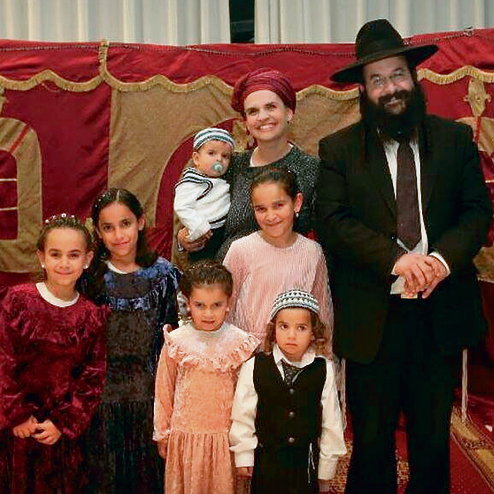
Is it God’s will?
“That’s a question I have discussed with my students at the Ma'ale Levona religious girls’ high schools,” Yael says. “They knew Raziel from the Shabbat get-togethers. The last time we attended, he argued with them about a major halachic debate—whether something could happen in the world that is against God’s will.
“Raziel said it could happen, that there could be a situation in which a person dies without God sentencing him. The students refused to accept it. Raziel promised them an answer in the next Shabbat get-together. Now, I had to give them my own answer. I told them it wasn’t God’s original will. God’s will is for a person to live at least 70 years, collect rights and light up the world. When a person is taken away like this, it’s with God’s consent, but it isn’t God’s will. I won’t accept it as a punishment either.”
“Of course it isn’t a punishment,” says Miriam.
“It isn’t clear to everyone,” Yael says. “A punishment has an educational purpose too, so it should be reversible. Our situation is irreversible, so it can’t be a punishment. There’s something else here. I feel like I haven’t lost a husband, but like I have handed him over to a different sphere. God needs the martyrs next to him, as public victims, not as a punishment for the private person and not as a punishment for the people.”
“I don’t really see it as something mystical, that God needs people next to him,” says Miriam. We have to look at it in a simplified manner. No land is bought without war, and unfortunately, a war leads to casualties. There is a war of soldiers and there is a war of the citizens across the country, and even more in Samaria. It has always been like this, from the undergrounds through all the wars and terror to our time.”
How do you deal with the fear?
Yael raises an eyebrow and gives me a penetrating blue gaze. “What is there to be afraid of?” she asks in astonishment.
The shooting on the roads, the knives at the junctions. I admit I’m afraid sometimes.
“There’s no fear whatsoever,” Yael says firmly. “Don’t you understand I’ve been chosen? If you’ve been chosen, you’ve been chosen, and if you haven’t been chosen—you haven’t been chosen.”
Itamar’s dance
Miriam doesn’t feel she is living in fear either. She grew up in Har Brakha, the closest Jewish community to Nablus, from the age of 18 months. Her family, the Badash family, is one of the community’s veteran and leading families. Three of her married sisters live nearby.
Unlike Havat Gilad, which is characterized by a more rural life, Har Brakha has a rich communal urban-style life. The community, which includes some 2,200 residents and where 100 children are born every year, has made a decision in principle to stop building one-floor houses but rather condominium complexes. The Ban Gal family lives in an apartment building too. Three new five-story buildings next to them have been recently populated by 54 families.
The community, which was built around the Har Brakha Yeshiva led by Rabbi Eliezer Melamed, is a symbol of combining Torah life with academia, economy and education. Rabbi Melamed encourages his young students to pursue academic studies and contribute to the Israeli labor market.
In recent years, the community has been attracting young couples and students, who are able to purchase cheap apartments there and enjoy the benefits of good educational institutions, as well as a scholarship at the nearby University of Ariel.
Many of the young couples come from city centers rather than from the settlements. So did Itamar. The son of Daniel and Shoshana, and the brother of Shira, Ruhama, Iscah, Refael and Neria, grew up in the city of Rehovot but became an integral part of Har Brakha. Alongside his work as an educator, Itamar began studying for a master’s degree in Jewish heritage at Ariel. At first his dissertation instructor, Prof. Yossi Goldstein, rejected the subject suggested by Itamar, “Zionism in Har Brakha,” but he was eventually unable to refuse the student’s passion.
The passion, the vigor and the diligence characterized him as an educator as well. The students talk about a teacher who saw his students as his sons and cared for them the entire time.
“He was very busy writing the students’ report cards in recent weeks,” says Rabbi Shlomi Badash, Miriam’s father, one of the founders of Har Brakha and a teacher at the Karnei Shomron Yeshiva. “He said every comment he put in the report card was crucial. So he wrote the comments and then consulted his parents, who are both amazing educators and special people, and then he sat down with Miriam and then with my wife, his mother-in-law. And then he sent everything to the school counselor for another opinion.
“He taught at Givat Shmuel for only six months, and they had already become so attached to him. There was no doubt he would go on to become a principal and yeshiva head within a short period of time. He had warmth, amazing serenity and unusual organization skills and vision.
“As a teacher at the Har Brakha Yeshiva, he was also the leader, the engine. He was responsible for recruiting students and later for keeping in touch with students serving in the army. He had a personal connection with each and every one of them. He would travel all the way to Eilat to visit students who served in the army there. He used to send the students personal amazing messages on his cell phone. You won’t see this kind of thing in any hesder yeshiva (a yeshiva program which combines advanced Talmudic studies with military service).”
“Last summer, he initiated and organized a religious summer camp on his own,” says Yaakov Weinberger, the community spokesman. “I said to him, ‘Who will come?’ But he wrote and designed a nice ad, and soon enough there were 30 applicants and we had to stop the registration. The camp was an amazing success. Last Thursday, we sat down to plan the next camp. I said to him, ‘Up to 45 guys.’ He said, ‘Absolutely not. Think big. At least 100 guys,’ and he opened his arms enthusiastically, as always. Who’s going to organize it now?”
Itamar’s enthusiasm was also reflected in the mitzvah of giving joy to a bride and groom. With bright, slanted eyes and a wide smile, he would dance around at weddings, raising his hands in the air. “Itamar became famous for the way he danced at weddings,” says Miriam. “He would dance wholeheartedly. His tie because a trademark too.”
“One of Itamar’s cousins came to the funeral with a tie and placed it on the new grave,” says Rabbi Badash. “A tie is a symbol of harmony, of compatibility, of living with beauty and splendor. That’s Itamar.”










